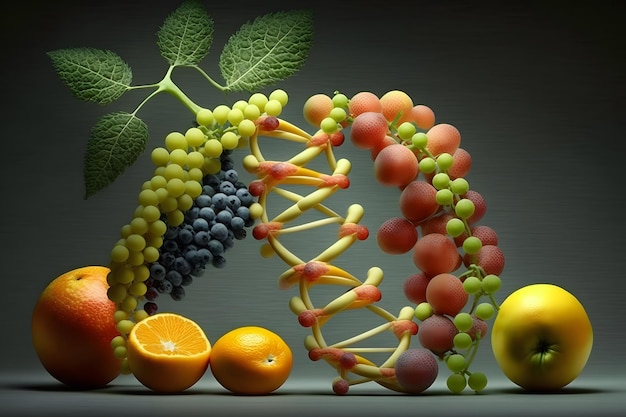DNA Dieting: The Future of Personalized Nutrition in the US?

The Rise of Personalized Nutrition is revolutionizing wellness in the US, with DNA-based dieting emerging as a promising approach that tailors dietary recommendations to an individual’s unique genetic makeup, potentially optimizing health outcomes and transforming the future of nutrition.
The quest for optimal health and wellness has led to numerous dietary trends, but none quite as individualized as DNA-based dieting. The rise of personalized nutrition, particularly DNA-based approaches, is rapidly gaining traction in the US. But is this truly the future of wellness, or just another fad?
Understanding Personalized Nutrition
Personalized nutrition takes a departure from generic dietary advice, emphasizing that what works for one person may not work for another. This approach considers individual factors such as genetics, lifestyle, and health status to create tailored dietary recommendations.
The Basics of Personalized Nutrition
At its core, personalized nutrition is about understanding the unique needs of an individual. It leverages data from various sources to craft dietary plans that optimize health outcomes. This data can include:
- Genetic information
- Metabolic markers
- Gut microbiome composition
By integrating these elements, personalized nutrition aims to provide dietary recommendations that are more effective and sustainable than traditional, one-size-fits-all approaches.
The Broad Appeal of Personalized Nutrition
The appeal of personalized nutrition lies in its promise to address specific health concerns, enhance athletic performance, and promote overall well-being. It acknowledges that individuals respond differently to various foods and nutrients, paving the way for more targeted interventions.

Ultimately, the goal is to empower individuals to make informed choices about their diet, leading to improved health and a greater sense of control over their well-being.
In summary, personalized nutrition represents a paradigm shift in dietary science, focusing on individual needs and responses rather than generic guidelines. This approach holds significant potential for improving health outcomes across diverse populations.
The Science Behind DNA-Based Dieting
DNA-based dieting, a subset of personalized nutrition, utilizes genetic testing to identify predispositions to certain health conditions, nutrient deficiencies, and metabolic traits. This information is then used to create a diet tailored to an individual’s genetic makeup.
How DNA Tests Inform Diet
DNA tests analyze specific genes that influence how the body processes nutrients, metabolizes fats, and responds to carbohydrates. Some common genes analyzed include:
- FTO gene: Associated with obesity risk and fat metabolism.
- MTHFR gene: Related to folate metabolism and detoxification.
- ACTN3 gene: Linked to athletic performance and muscle function.
By understanding these genetic variations, healthcare professionals can make informed recommendations about macronutrient ratios, vitamin supplementation, and lifestyle modifications.
The Accuracy and Reliability of DNA Testing
The accuracy of DNA testing has improved significantly in recent years, but it’s essential to consider the limitations. Genetic tests can provide valuable insights, but they are not foolproof. Other factors, such as environment and lifestyle, also play a significant role in health outcomes.
Therefore, DNA-based dieting should be seen as one piece of the puzzle, complementing other approaches to personalized nutrition. It’s imperative to consult with qualified healthcare professionals to interpret the results and develop a comprehensive dietary plan.
In conclusion, DNA-based dieting harnesses the power of genetic information to tailor dietary recommendations, providing a unique and personalized approach to nutrition. While not without its limitations, it offers valuable insights that can enhance health and well-being.
Benefits of Tailoring Your Diet to Your DNA
Tailoring your diet to your DNA offers several potential advantages over traditional dietary approaches. By aligning your food choices with your genetic predispositions, you can optimize your health and minimize the risk of developing certain health conditions.
Optimizing Nutrient Intake
One of the primary benefits of DNA-based dieting is the ability to optimize nutrient intake. Genetic testing can identify deficiencies or increased needs for specific vitamins and minerals, allowing for targeted supplementation.
Reducing Risk of Chronic Diseases
DNA-based dieting can also help reduce the risk of chronic diseases. By understanding your genetic predispositions to conditions like heart disease, diabetes, and obesity, you can make proactive dietary changes to mitigate these risks.

For example, if you have a genetic predisposition to insulin resistance, you may benefit from a low-carbohydrate diet to improve blood sugar control.
Enhancing Athletic Performance
Athletes can also benefit from DNA-based dieting. Genetic testing can reveal insights into muscle fiber composition, oxygen utilization, and recovery rate, allowing for tailored training and nutrition strategies to enhance performance.
Overall, tailoring your diet to your DNA offers a powerful means of optimizing health, reducing disease risk, and enhancing performance. By leveraging the insights of genetic testing, you can unlock a more personalized approach to nutrition.
Potential Drawbacks and Criticisms
While DNA-based dieting holds promise, it is not without its drawbacks and criticisms. It’s essential to consider these factors before adopting this approach to personalized nutrition.
Scientific Limitations
One of the primary criticisms of DNA-based dieting is the scientific limitations of genetic testing. While certain genes have been linked to specific health traits, the interactions between genes and environment are complex and not fully understood.
Ethical Considerations
Ethical considerations also come into play. Privacy concerns surrounding the collection and storage of genetic data must be addressed to protect individuals’ rights and prevent misuse of information.
- Cost: DNA tests can be expensive, potentially creating a barrier to access for some individuals.
- Misinterpretation: Without proper guidance, individuals may misinterpret genetic test results and make inappropriate dietary changes.
- Oversimplification: DNA-based dieting may oversimplify the complex interplay of factors that influence health, neglecting the importance of lifestyle and environment.
It is essential to weigh these potential drawbacks and criticisms carefully before embracing DNA-based dieting. Consultation with healthcare professionals and responsible data handling practices are crucial for maximizing the benefits and minimizing the risks.
In summary, while DNA-based dieting offers potential advantages, it also raises valid concerns regarding scientific limitations, ethical considerations, and practical challenges. A balanced and informed approach is essential for navigating this emerging field.
How to Get Started with DNA-Based Dieting
If you’re interested in exploring DNA-based dieting, there are several steps you can take to get started. From selecting a reputable testing service to working with a qualified healthcare professional, careful planning is essential for a successful experience.
Choosing a Testing Service
The first step is to choose a reputable DNA testing service. Look for companies that have a strong scientific foundation, transparent practices, and positive reviews. Consider factors such as:
- Test accuracy and validity
- Data privacy and security measures
- Customer support and resources
Interpreting Your Results
Once you receive your DNA test results, it’s essential to interpret them correctly. This may involve consulting with a registered dietitian, a genetic counselor, or a healthcare provider who specializes in personalized nutrition.
Developing a Personalized Diet Plan
Your healthcare professional will help you develop a personalized diet plan based on your genetic profile, lifestyle, and health goals. This plan may include recommendations for macronutrient ratios, vitamin supplementation, and specific food choices.
Remember that DNA-based dieting is just one aspect of a comprehensive approach to health and wellness. It should be integrated with other healthy habits, such as regular exercise, stress management, and adequate sleep.
In conclusion, getting started with DNA-based dieting involves careful planning, collaboration with healthcare professionals, and a commitment to holistic health practices. By taking these steps, you can unlock the potential benefits of personalized nutrition and optimize your well-being.
The Future of Personalized Nutrition
Personalized nutrition is poised to play an increasingly significant role in shaping the future of healthcare. With advancements in technology and a greater understanding of the human genome, this field is expected to evolve rapidly.
One trend to watch is the integration of artificial intelligence (AI) and machine learning in personalized nutrition. AI algorithms can analyze vast amounts of data to identify patterns and predict individual responses to dietary interventions.
Another area of growth is the development of more precise and comprehensive genetic tests. As researchers uncover more gene-diet interactions, DNA-based dieting will become more targeted and effective.
Furthermore, personalized nutrition is likely to become more accessible and affordable. As the cost of genetic testing decreases and more healthcare providers embrace this approach, it will become an integral part of mainstream healthcare.
- Wearable Technology: Integration of wearable devices for real-time monitoring of physiological responses to food.
- Gut Microbiome Analysis: Combining DNA data with gut microbiome information for a more holistic picture.
- Policy Changes: Potential for insurance coverage and healthcare policies to support personalized nutrition.
In conclusion, the future of personalized nutrition is bright, with advancements in technology, increased accessibility, and integration into mainstream healthcare. As we continue to unlock the secrets of the human genome, personalized nutrition will play an increasingly vital role in promoting health and preventing disease.
| Key Aspect | Brief Description |
|---|---|
| 🧬 DNA-Based Dieting | Uses genetic testing to tailor dietary recommendations. |
| 🍎 Optimized Nutrition | Addresses individual nutrient needs based on genetics. |
| 💪 Performance Boost | Athletes can use insights to enhance training. |
| 🤔 Ethical Concerns | Privacy and misuse of genetic data are potential risks. |
Frequently Asked Questions
DNA-based dieting involves tailoring dietary recommendations based on an individual’s genetic makeup, as revealed through DNA testing, aiming to optimize nutrient intake and health outcomes.
While DNA tests have improved, they are not foolproof. They provide insights into genetic predispositions, but lifestyle and environment also play significant roles in health.
Personalized nutrition can optimize nutrient intake, reduce the risk of chronic diseases, enhance athletic performance, and promote overall well-being by addressing individual needs.
Potential drawbacks include scientific limitations, ethical concerns about data privacy, the cost of testing, and the risk of misinterpreting results without professional guidance.
Start by choosing a reputable testing service, consult with a healthcare professional to interpret your results, and develop a personalized diet plan integrating lifestyle and health goals.
Conclusion
In conclusion, the rise of personalized nutrition, particularly DNA-based dieting, holds considerable potential for revolutionizing wellness in the US. While challenges and criticisms remain, the promise of tailored dietary recommendations that optimize health outcomes makes it a compelling area of exploration. As technology advances and our understanding of the human genome deepens, personalized nutrition is likely to play an increasingly vital role in shaping the future of healthcare.
